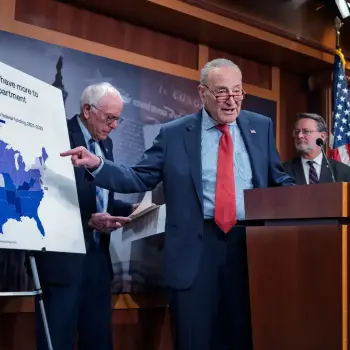NOTE: Thank you to Dr. Ryan Denison for writing today’s Daily Article. He is the Denison Forum Senior Editor for Theology and has written more than four hundred articles for the Denison Forum.
Five states held primaries in advance of the November general election yesterday, and much of the talk continues to revolve around someone who wasn’t even on the ballot.
Of the sixteen Republican primaries, former President Donald Trump has endorsed a candidate in seven. As such, the elections were seen by many as an important litmus test for Trump’s continued power within the Republican Party. If yesterday’s results truly offered such a barometer, he can’t be very happy.
The biggest tests came in North Carolina and Pennsylvania, where the former president backed two controversial candidates. In Pennsylvania, as of Wednesday morning, Trump-favorite Mehmet Oz holds the slimmest of leads, but the election is too close to call and appears headed for a recount. In North Carolina, Madison Cawthorn, whose first term as the youngest person elected to Congress since 1965 was defined more by scandals than accomplishments, lost a closely contested election to Chuck Edwards.
Idaho’s gubernatorial primary was seen as another test. Trump threw his support behind Lieutenant Governor Janice McGeachin in her unsuccessful bid to unseat Gov. Brad Little. While McGeachin was a long shot from the start, had she won it would have been a big boost to the former president’s perceived influence.
But while several races did not deliver the resounding reminder of his impact that he might have hoped, he did back winners in Doug Mastriano, who will represent the Republicans in the race to become Pennsylvania’s next governor, and Ted Budd, who won the primary for North Carolina’s vacant senate seat.
Whether yesterday’s news actually portends a diminishment of the former president’s power within the Republican party remains to be seen. But even if his influence fades, he is likely to remain newsworthy for the foreseeable future.
However, those seeking office were not the only politicians to make headlines yesterday.
What is the Domestic Terrorism Prevention Act?
Lawmakers in the House of Representatives are planning to vote soon on the Domestic Terrorism Prevention Act. If passed, the bill would establish “new requirements to expand the availability of information on domestic terrorism, as well as the relationship between domestic terrorism and hate crimes” by authorizing “the Department of Homeland Security (DHS), the Department of Justice (DOJ), and the Federal Bureau of Investigation (FBI) to monitor, analyze, investigate, and prosecute domestic terrorism.” The law goes on to name white supremacists and neo-Nazis as examples of the kinds of domestic terrorism that would be targeted.
That last part appears to be motivated specifically by the shooting in Buffalo last weekend but is also likely intended to help the law move beyond the critiques that have kept its previous iterations from finding much support.
You see, this is not the first time that Congress has tried to pass such a bill. Similar legislation was introduced in 2017 but never reached the point where Congress actually voted on it. Subsequent efforts met a similar fate.
During those attempts, some of the strongest opposition came from minority rights groups like the ACLU, who pointed out that the government agencies named in the bill “have long used the domestic terrorism framework to monitor and investigate people of color and other marginalized communities, rights activists who dissent against government policies, and those with views agencies deem controversial.”
They went on to add that “although the Act is well intentioned, it would entrench long-standing problems with domestic terrorism frameworks, and result in the further unjustified and discriminatory surveillance, investigation, and prosecution of people of color and other marginalized communities, including those engaged in First Amendment-protected activities.”
While the language in the current bill focusing on white supremacist and neo-Nazi acts seems to be aimed at addressing those fears, the fundamental concerns extend beyond minority communities to speak to the larger problems that have often resulted from giving the government the kind of authority and reach described in the Act.
Rep. Tom Cole, the top Republican on the House Rules Committee, said of the legislation that “it mandates reports that haven’t been asked for, creates more bureaucracy where ample exists, and has a chilling effect that will limit state and local law enforcement’s efforts to recruit and retain qualified candidates.”
While that last part is, perhaps, a bit speculative, the bill does have the feel of a response driven more by the desire to do something than by the need to do something right. Rarely has that ended well.
When Israel chose rashly
Tragedies have a way of inspiring us to action. Whether it’s a natural disaster, freak accident, or an act of terrorism, we routinely see people get united and energized around perceived solutions in a way that cuts through the reservations that often hinder change.
Unfortunately, that impulse to do something often means people act without thinking about the long-term consequences of their decisions.
Israel’s desire for a king emerged from a similar motivation and illustrates this principle well.
Samuel was among the greatest leaders Israel had known. He emerged at a time when God’s people were steeped in sin and dominated by the Philistines. He led them back to God and helped them win their freedom. Toward the end of his life, he appointed his sons to lead them in his place. However, “his sons did not walk in his ways but turned aside after gain. They took bribes and perverted justice” (1 Samuel 8:3).
For a people who had just begun to have hope again and enjoy the reminders of God’s promises, the thought of being led back into sin and slavery was terrifying. Something had to be done. They just chose the wrong something.
Rather than heed Samuel’s warnings and trust that God would raise up others who could lead them well, “the elders of Israel gathered together and came to Samuel at Ramah and said to him, ‘Behold, you are old and your sons do not walk in your ways. Now appoint for us a king to judge us like all the nations’” (1 Samuel 8:4–5).
The result was Saul and a cycle of kings who, with a few exceptions, led them to the point where they not only lost their freedom, but also their homes, their Temple, and their basic way of life.
When we make decisions based on the perceived need to do something without stopping to think about the long-term consequences, those decisions rarely make our situation better.
So let’s learn from Israel’s mistake and, instead of allowing our fears to lead us to folly, pray for God’s wisdom and direction with the commitment to act once we receive it—but not before it arrives.
Whether our fears for the future are based on the threat of domestic terrorism, political uncertainty, or any number of other factors, God has a plan to redeem them and advance his kingdom in the process. If we want to experience that redemption, though, we have to be more committed to doing the right thing than to doing something.
Are you?












